Sometimes women's achievements both big and small go unnoticed and underappreciated. That is why I am so excited that this year's NAIDOC theme celebrates all things women with 'Because of her, we can.'
- By Georgia Capocchi-Hunter
As a proud Wurundjeri young person I look to the leaders and Elders of my community for inspiration, strength and knowledge. Some of those women are not as well-known as others but hold no less of an importance in my life and the lives of other Wurundjeri people. My Aunties, cousins and Elders have raised me, shaped me and taught me throughout my life.
Below are a few strong Wurundjeri women I look up to and who guide me throughout life. While there are many more these to me are worth a special mention.

-
Annie Borate

-
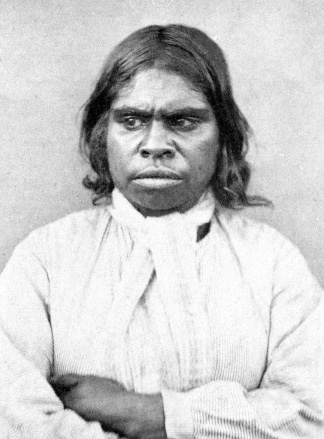
Annie was the daughter of Bebejan who was Ngurungaeta (head man) of the Wurundjeri people and Tooterie, and was the younger sister of William Barak. She was born on the Plenty River at the beginning of Victoria’s European settlement. Annie, known traditionally as Borate attended Merri Creek Mission School in the 1840’s. She bore several children, with only her eldest son, Robert Wandin (Wandoon) surviving to adulthood.
I couldn’t even think of writing a list such as his one and not including Annie Borate. A Matriarch of the Wurundjeri people all Woiwurrung/Wurundjeri people are her descendants through her son Robert Wandin.
I hold a lot of respect for Annie Borate as if it weren’t for her neither I nor my family would be around and our culture would not have survived as long as it has.
-
Aunty Winnifred Evelyn Quagliotti

-
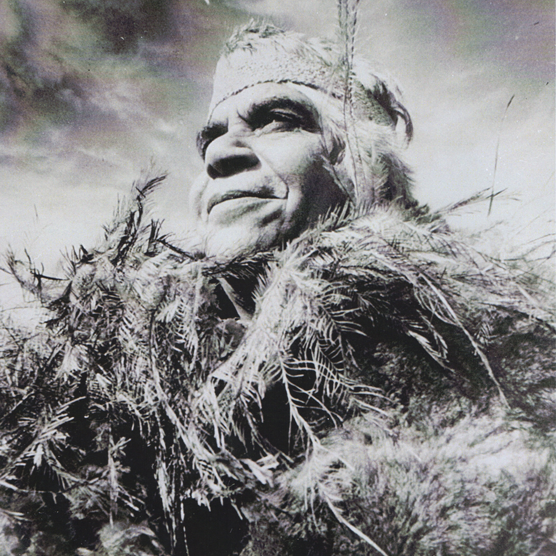
Aunty Winnie Quagliotti (née Terrick) was a prominent Elder of the Wurundjeri community. She was passionate about the need to preserve cultural heritage in Victoria and was admired for her pragmatic solutions to the issues affecting her people.
Aunty Winnie was born at Koondrook-Barham on the border of New South Wales and Victoria to William Terrick and Jessie (née Wandin) and was one of ten children. She lived on Coranderrk mission where her father was a truck driver and would catch the bus into Melbourne with her cousin and stay with family in Fitzroy. It was there she witnessed the birth of the Aboriginal civil rights movement. Winnie married Edward Mullins, whom she met on a rabbiting trip to Deniliquin, New South Wales and had 2 children before separating. Winnie fostered many more children over the years. While in Sydney, she met Paul Quagliotti, a man from Trieste in Italy and the two settled in the Melbourne suburb of Doveton in 1968.
A few years later Aunty Winnie and her brother helped form an association with other local families to deliver housing, welfare and employment services to the Aboriginal community in Dandenong. It was incorporated as the Dandenong and District Aborigines Co-operative Society Ltd (DDACSL) in 1975 and Winnie was the organisation's first chairperson, a position she held until 1988.
She was the founding member of the Wurundjeri Tribe Land and Compensation Cultural Heritage Council Incorporated In 1985 and was elected as its Chair and spokesperson, in recognition of her ability to build united fronts on issues such as land rights. As a highly respected Elder of the Wurundjeri people, Aunty Winnie was called on by members of local councils, state and federal ministers and business leaders and even had an audience with the Queen. She educated communities on the need to preserve and revive Aboriginal culture.
Aunty Winnie protested against the arrival of the tall ships in Melbourne as part of the nation's bicentenary celebrations in 1988. The image of her standing defiantly in her possum skin cloak is a powerful one and inspired a mural commissioned by the International Labour Organisation, which reflected Aunty Winnie's image onto a building in Wall Street, New York.
Sadly, she passed away after a stroke at only 56 years of age in 1988. Obituaries ran in newspapers and on television, and hundreds attended her funeral. The following year, her image once again adorned a Moomba float in tribute. Aunty Winnie is buried at her beloved Coranderrk Cemetery.
Even though I never got to meet her Aunty Winnie is everything I aspire to be – a strong, empowered, proud Wurundjeri woman who would do anything to help her community. Her love for community and her many children continues to inspire me to do better and be better. I hope in the future I can be even half the leader she was.
-
Aunty Jessie Hunter (Nanna Jessie)

-
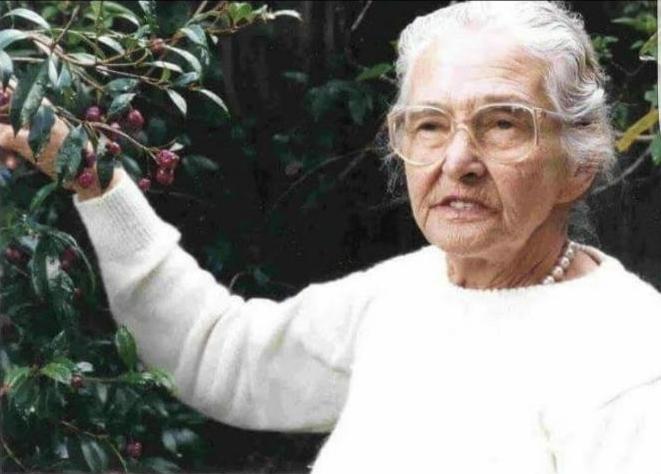
Nanna Jessie, whose traditional name was Gumbri, was born in 1921 to Martha and Claude Nevin on Coranderrk Mission and was one of eight children. She was the last girl to be born on Coranderrk, a government reserve for Aboriginal people in the state of Victoria from 1863 to 1924, located about 50km north-east of Melbourne near Healesville.
My Nan was forced to run with her family to Koondrook to escape being taken by the government and they went into hiding. At this time she was brought up to believe she was white, only learning about her culture when she went back to visit her grandparents at Coranderrk.
She married my Poppy, Colin, and had 5 sons together, one of whom is my grandfather. I don’t have many memories of her unfortunately as she passed when I was 4 however she left a lasting impression not only on myself but my whole family.
She was an amazing baker and always had cakes in the tin ready for when people came over. She was a kind, welcoming woman and loved to sit and yarn with people over a cuppa.
She had a dream of releasing a book on Wurundjeri bush foods and medicines, something she never got the opportunity to do before she passed. She instilled a pride in her children regarding their culture and identity which has been passed down to their children and to their grandchildren.
My nanna Jessie was a beautiful, strong matriarch and instilled a love of cooking in our family, especially my grandfather, Norm which in turn was passed down to me as well. She reminds me to always be kind and always make sure there’s a cake or a biscuit ready for someone who might need a chat.
-
Aunty Diane Kerr

-
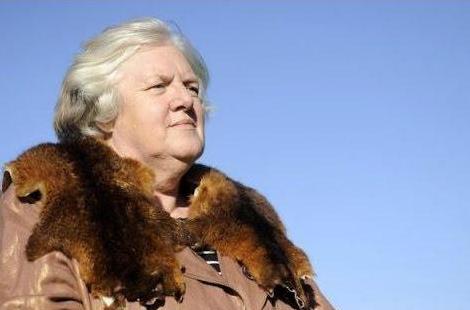
Aunty Diane Kerr is a respected Elder of the Wurundjeri Tribe, and a Mother, Grandmother and Aunty to many across several generations. Born in Melbourne in 1954, Aunty Di identifies with the Ganun Willam Balak clan of the Wurundjeri and save for one year where she resided in Canberra has always lived on Wurundjeri country. As a young girl she often spent holidays visiting Maroondah Dam and remembers when it was beautiful countryside with flowing creeks and open grassland. Aunty Di is the matriarch of her family and takes pride in being a mother, stepmother, foster mother, aunty and a grandmother. Her family consists of five children - three of which are her own, a foster son and a cultural daughter – but her home and heart are open to many.
Aunty Di has devoted much of her life to her local community as both a mentor and foster carer and has worked in various fields including child care, education, native title, Stolen Generation support, and other community work, her passion, however, lies in the social and emotional wellbeing of Aboriginal communities.
Aunty Di has been actively involved with the Royal Women’s Hospital in Melbourne. In 2013 she chaired the hospital’s Community Advisory Committee and was also a member of its Consumer Committee. She helped found research at the University of Melbourne’s Heart Research Centre around mental illness and chronic disease afflicting the Wurundjeri people. Aunty Di believes that many Aboriginal people’s health problems stem from ‘a type of post-traumatic syndrome disorder’ which seeps into our culture and comes from ‘the stress and distress of being removed off country.’
Since 2014 Aunty Di has been conducting women’s ceremonies for Aboriginal girls – something I had the honour of being a part of. The ceremonies enable the girls to approach womanhood with confidence, having gained a connection to country, knowledge of their identity and a general sense of well-being. Aunty Di is committed to improving the lives of those around her. The responsibility of guiding younger generations is very important to her and she works hard to uphold Aboriginal culture in a modern, urbanised world.
There is so much more I could say about Aunty Di but I would be here forever. She is an amazing and intelligent woman who I am so honoured to know and call family. She inspires me as well as many others to be a more caring and kind person and I hope she is proud of the woman I am becoming.
-
Mandy Nicholson

-
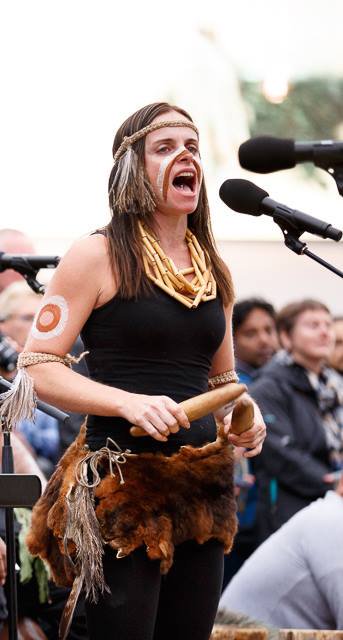
Mandy was born in Healesville and is a member of the Wurundjeri-willam clan of Melbourne with connections to the Dja Dja Wurrung and Ngurai Illam Wurrung language groups of the Central/Eastern Kulin Nation on her father’s side and German on her mother’s. Mandy has two daughters, Dharna and Ky-ya who are also very in touch with their culture and are great examples of strong Wurundjeri young people.
Mandy is a recognised artist, having produced carvings, etchings, prints, airbrushed works, ceramic pieces, murals, corporate logos, children's clothing and public art works over the last 25+ years. She gained a Bachelor of Arts (Honours) in Aboriginal Archaeology in 2011 and has worked for the Victorian Aboriginal Corporation for Languages for 6 years and is now a PhD candidate studying how Aboriginal people connect to Country, off Country. She is also a mentor to young Indigenous girls, through learning and teaching of culture, language, dance and ceremony.
Mandy is the leader/singer of the Djirri Djirri dance group. Djirri Djirri is the Woiwurrung (Wurundjeri) name for Willy Wagtail, a little black bird known to ‘dance’ all the time. Djirri Djirri dance group offer dance that is a contemporary interpretation of Wurundjeri culture with the essence of traditional dance/ceremony. All dances have a story about creation, family and Country. I am lucky enough to be a part of this dance group with my older and younger cousins as well as my aunts. The children are encouraged to sing and dance and we often have my little cousins some as young as 6 on the microphone together signing in language.
Mandy is also a Woiwurrung specialist, helping revive a language that has been sleeping for many generations. She passes her knowledge on to everyone and it is clear to see her influence as a cultural leader and mentor in the community.If it weren’t for Mandy I wouldn’t be half as close to my culture as I am. I often tell people that I always felt like something was missing and that when I joined her dance group and was able to dance my culture with my family I finally found that missing piece. She also inspires me to try and learn my language as I feel that will also help me feel closer to country.
-
Tammy Hunter (Mum)

-
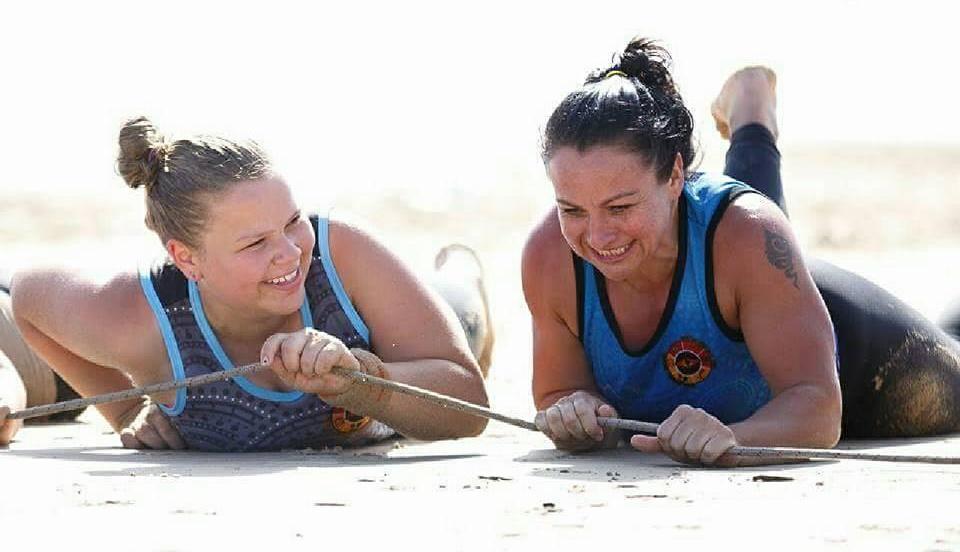
Last but not least is my mother, Tammy Hunter. She brought me in to this world, cherished me and raised me never knowing anything but love, kindness and culture. She is my biggest role model and the person who means the most to me in this world.
Mum is the daughter of respected Wurundjeri Elder Norm Hunter and Annette Hunter, and is the second youngest of 6 children. She grew up in Broadmeadows and has lived all around Melbourne before finally settling in Brisbane with her husband Chicka Turner at the beginning of this year.
Mum has worked for many different organisations – always with the Aboriginal community in some capacity. Previously she worked with Park Victoria as a ranger, the Australian Indigenous Leadership Centre facilitating Cert II’s and IV’s in leadership, she was employed with Aboriginal Affairs Victoria managing education, employment and women's and men's programs, and also with the Victorian Aboriginal Child Care Agency as the State-wide Coordinator for Aboriginal Cradle to Kinder. She also worked at Victorian Aboriginal Health Service as the Healthy Lifestyle team leader and is incredibly passionate about health, fitness and wellbeing within the Indigenous community and she currently works at the Institute for Urban Indigenous Health as the Workforce Training and Development Project Officer in Brisbane.
Some of her proudest achievements include facilitating the Indigenous leadership courses and being a recipient of the Winston Churchill Memorial Trust Fellowship in which she was able to travel to Indigenous communities in New Zealand, Canada and America. I was able to go on this trip with her and as an 8 year old it was truly amazing and such a great learning experience. Meeting all the different people and learning about their cultures was eye opening and made me appreciate what I had but also made me long for what could have ben as a lot of the people we spoke to were able to speak their language, something neither my mum nor I can do.
My mum is a strong Wurundjeri woman and is one of the most important people in my life. She has raised me to be a strong, intelligent woman who is proud of her culture and I hope that I make her proud every day. Every day she inspires me and continues to show me why she is one of my biggest role models.
It is because of her I am connected to country, it is because of her that my community and culture is the most important thing in my life, it is because of her I am able to feel proud to be Aboriginal, it is because of her I am able to educate others, it is because of her I am passionate, it is because of her I am kind, it is because of her I am strong. It is because of her, I can.
